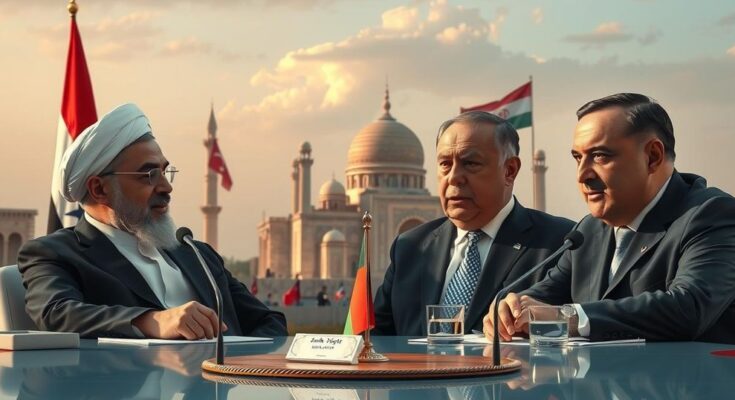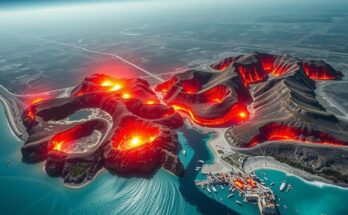Egypt is currently hosting the presidents of Iran and Turkey at a summit of eight Muslim-majority nations known as the Developing-8. The meeting addresses critical regional issues, including tensions arising from military conflicts, maritime security, and efforts to stabilize relations weakened by past tensions. Amid a shifting geopolitical landscape, this summit underscores the transformative role of non-Arab actors in Middle Eastern politics.
On Thursday, Egypt hosted a significant summit involving the presidents of Turkey and Iran, amidst discussions among eight Muslim-majority nations known as the Developing-8. The summit took place in Egypt’s New Administrative Capital and reflects shifts in regional power dynamics as Iran and Turkey play increasingly influential roles. Notably, the event is occurring against a backdrop of ongoing tensions in the Middle East, most critically affecting Hamas and Hezbollah due to military setbacks in their respective engagements with Israel.
Turkish President Recep Tayyip Erdogan and Iranian President Masoud Pezeshkian convened to address various regional issues, marking their first encounter since the recent ousting of Syrian President Bashar Al Assad, a significant outcome influenced by Turkish support for opposition factions. President Pezeshkian’s visit is notable, being the first by an Iranian leader to Egypt since 2013.
Egyptian President Abdel Fattah El Sisi is anticipated to tackle maritime security, specifically the threat posed to Red Sea shipping by Iranian-backed Houthi forces. These attacks have severely impacted Egypt’s Suez Canal revenues, which are crucial for the country’s economy. Key topics also include the ongoing conflicts in Gaza and Lebanon, underscoring the continued influence of Iranian proxies.
Efforts to normalize Egyptian-Iranian relations, which have historically been strained, are also relevant to discussions. While engagement between the nations has improved, remaining diplomatic tensions indicate a complex political landscape. The summit featured deliberations on the humanitarian crises in Gaza and Lebanon, highlighting the need for cooperative solutions among D-8 member states, which also include Nigeria, Pakistan, Bangladesh, Indonesia, and Malaysia.
Overall, Turkey and Egypt have begun to mend relations previously marred by accusations of supporting extremist groups, reflecting a mutual interest in stabilizing the region while still backing opposing factions in ongoing conflicts in Libya and Sudan.
The Developing-8 Organization for Economic Co-operation was established in 1997 to promote collaboration among member states, which include Egypt, Turkey, Iran, Nigeria, Pakistan, Bangladesh, Indonesia, and Malaysia. The geopolitical landscape has notably changed, especially with Turkey and Iran gaining influence in Middle Eastern affairs previously dominated by Arab states. Recent conflicts, including the war in Gaza and the dynamics in Syria and Lebanon, have necessitated a realignment of alliances and dialogues to address mutual security concerns and economic interests within the region. The ongoing tensions in the area, particularly involving Iran’s proxies and Turkey’s shifting role, signify a complex interplay of regional dynamics that necessitate discussion and cooperation among leaders at summits such as the one hosted by Egypt.
The D-8 summit hosted by Egypt signifies a critical moment in the evolving geopolitical landscape of the Middle East, with Turkey and Iran emerging as prominent players amidst traditional Arab influence waning. Key discussions focused on regional security issues, including maritime threats and ongoing conflicts. Efforts to improve Egyptian-Iranian relations persist, albeit against a backdrop of historical tensions. As the dynamics continue to shift, cooperation among Muslim-majority nations will be essential in addressing pressing challenges and fostering stability in the region.
Original Source: www.thenationalnews.com




